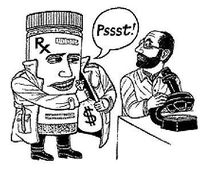 I wrote a piece about health care recently, for a financial site, and had it thrown back in my face. You can read it, but I won’t get paid a penny if you do.
I wrote a piece about health care recently, for a financial site, and had it thrown back in my face. You can read it, but I won’t get paid a penny if you do.
This is not the first time this happened. It happened in 2011. Back then I was calling IBM’s hiring of Virginia Rometty as CEO an historic mistake.
Back then shares in IBM were selling for about $180/share. It’s now below $140, and the company has almost entirely missed the most profound tech story of the decade, the cloud-and-device revolution. They still claim a place in the cloud, but it’s a small place, and a precarious one. Meanwhile, even companies like Adobe have zoomed past them in market cap. Apple could now buy IBM about five times over.
Before continuing, let me add that there's nothing dishonest about what IBM did. I'd just seen this movie before, nice marketing people following entrepreneurs and leading the company onto the rocks, because technology is about innovation, and it can only be run effectively by innovators.
 The point is that while I am sometimes overwrought on business subjects, when I am then I am usually right. My point regarding Valeant was that its entire business model is based on what amounts to fraud. They buy generic drug companies, getting rid of market competition, then they get rid of researchers, hike prices unmercifully, manipulate the payment system, and export the profits to avoid taxes.
The point is that while I am sometimes overwrought on business subjects, when I am then I am usually right. My point regarding Valeant was that its entire business model is based on what amounts to fraud. They buy generic drug companies, getting rid of market competition, then they get rid of researchers, hike prices unmercifully, manipulate the payment system, and export the profits to avoid taxes.
That’s crooked on its face. Is all of it illegal? No. Unfortunately. (Some of it may be.) But that does not make any of it right, it does not make any of it moral, and it does not make it something anyone with an ounce of sanity should invest in.
Yet when I warn people away from it, my story gets spiked. OK, maybe it isn't my best writing. It may even be overwrought. But at least it's honest.
Unfortunately, there are too many investors who think the purpose of business is to screw people, and who want nothing more than to be in on the screwing. Martin Shkreli (above) was one such person. He bragged about it. He got arrested. He’s an exception.

This is not the only area where the benefits of the health care reform law are being squandered by monopolistic greed. As I pointed out in my piece, hospitals are running a similar scam, consolidating in many markets, then hiking prices to the sky. Insurers are going along.
There are things that can be done to stop this. Simple things. Things everyone ought to be in favor of. Let Medicare negotiate on drug costs, for one thing. That would save the government billions of dollars. Enforce antitrust laws, especially against hospitals. Provide incentives for insurers to negotiate better prices. Let insurers exchange data so pricing becomes more transparent across the board. Let insurers buy clinics and even hospitals – Intermountain does this and prospers, while keeping costs down.
None of this would destroy innovation, which is Pearson’s own claim whenever the idea comes up. It would actually create competition. It’s as conservative as it can be.
Here’s the problem. Honest businesses are pushed out when dishonest business practices like this are allowed to rule. And part of the job of the financial press should be to talk about dishonesty, to call it out, in order to protect the interests of honest businessmen, of investors and, ultimately, of the capitalistic economic system itself.
Why is this so hard to understand?

In the tech industry, it was long the practice to never criticize big advertisers, especially Microsoft. I was proud not to be employed by many of these magazines during the 1990s for precisely that reason. I worked on the periphery, I stayed in Atlanta, and I was fortunate that I didn’t have to compromise my principles. That’s why I never even considered a job in PR – I demand to control the story or why bother writing it?
As my first Northwestern lecturer, the late George Heitz, put it in the fall of 1977, “if you want to make a good living find a spouse with a good job.”
ZDNet, I’m proud to say, didn’t get in my way during the second half of the last decade, when I wrote their open source blog. But when I added a health IT gig, and an industry-paid “privacy advocate” pissed me off, I was summarily fired.
Maybe I’ve deserved some of the bad breaks I’ve suffered in my career. (When I have been fired, I think, I deserved it for my temperament alone.) I am, in many ways, insufferable. I hold my positions clearly, but also absolutely. When someone is lying to me, I tend to call them on it, often loudly. I have never been political, never been a diplomat, and never climbed a corporate ladder.

Only on the business beat, it seems, do the advertisers, and the powerful, control the story. It’s probably why so many people don’t trust the business press. Only on this beat can sources kill stories they don’t like, routinely. But if they really want to know why it is that many, many people feel anti-capitalist, even when the markets are doing well, this is their answer.
Killing the canary in the coal mine doesn’t make the air more breathable.











yep, you got me. it is one of the biggest reasons i became a fan of western european socialism or a social democrat(democratic socialist, whatever)
yep, you got me. it is one of the biggest reasons i became a fan of western european socialism or a social democrat(democratic socialist, whatever)
Another great article Dana.
Another great article Dana.